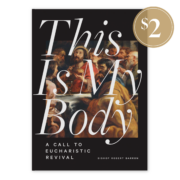This piece first appeared in the Winter 2019 “Economics” issue of Evangelization & Culture, the quarterly journal of the Word on Fire Institute. You can learn more and become an Institute member today to read more pieces like this.
Have you ever been to the Boundary Waters Canoe Area Wilderness in northern Minnesota? Oh, you should go. This refuge in the wild is a pristine, motor-free camping paradise. Just imagine this. Sporting Duluth Pack backpacks stuffed with packaged food, sleeping bags, and a tent, you hoist an inverted canoe onto your shoulders and traverse the forest (on uneven dirt portages) as you move from one lake to another. You sweat. You grow your beard (or leg hair). You suffer inevitable bug bites. But you truly live, if for only a little while, in a place of profound silence.
This age detests the things that silence brings us to: encounter, wonder, and kneeling before God.
The lake air is fresh. The only sound you hear is the gentle splash of your dipping oars, the water being cut by the tapered bow of the streaming canoe, or the occasional mournful cry of a distant loon. This place of deep remove is impossibly regenerative because it is quiet. Oh, of course there are sounds of nature, but there is no social media, no music, no television, no racing cars or manmade din of any kind. You can actually hear the wind. A brilliant writer and wilderness guide, Sigurd Olson, once wrote of the profound transformation he witnessed among his stressed-out clients after several days spent in the Boundary Waters. It was almost as if they, for a time, left their coiled, battered professional selves and became human again.

Sadly, there are few truly serene sanctuaries like the Boundary Waters anymore. Why is that? Because we have made it that way. In the name of progress and pleasure, we have willingly hemmed ourselves into a seemingly inescapable bubble of noise. Our lives are relentlessly assaulted by this clamor. And with noise comes an inability to simply be. Noise is jealous; it demands our attention now. We must start this, finish that, do this, get that, look here, go there. Go, go, go. Incessant noise is corrosive to the soul.
Pope Benedict XVI once lamented, “Put simply, we are no longer able to hear God—there are too many different frequencies filling our ears.”
And as Robert Cardinal Sarah wrote eloquently in The Power of Silence: Against the Dictatorship of Noise:
Our world no longer hears God because it is constantly speaking at a devastating speed and volume, in order to say nothing. Modern civilization does not know how to be quiet. It holds forth in an unending monologue. Postmodern society rejects the past and looks at the present as a cheap consumer object; it pictures the future in terms of an almost obsessive progress. Its dream, which has become a sad reality, will have been to lock silence away in a damp, dark dungeon. Thus there is a dictatorship of speech, a dictatorship of verbal emphasis. In this theater of shadows, nothing is left but a purulent wound of mechanical words, without perspective, without truth, and without foundation. Quite often ‘truth’ is nothing more than the pure and misleading creation of the media, corroborated by fabricated images and testimonies.
When that happens, the word of God fades away, inaccessible and inaudible. Post-modernity is an ongoing offense and aggression against the divine silence. From morning to evening, from evening to morning, silence no longer has any place at all; the noise tries to prevent God himself from speaking. In this hell of noise, man disintegrates and is lost; he is broken up into countless worries, fantasies, and fears. In order to get out of these depressing tunnels, he desperately awaits noise so that it will bring him a few consolations. Noise is a deceptive, addictive and false tranquilizer. The tragedy of our world is never better summed up than in the fury of senseless noise that stubbornly hates silence. This age detests the things that silence brings us to: encounter, wonder and kneeling before God.

If we cannot escape to places of silence like the Boundary Waters wilderness, if we cannot remove ourselves to an environment that forces a blessed quiet upon us, then we must find a place for silence, a placid interiority, right where we are. Like Yeats’ childhood idyll, The Lake Isle of Innisfree, we must “hear lake water lapping with low sounds by the shore / While [we] stand on the roadway, or on the pavements grey.”
Amid the noise and haste, the pressure and demands, the roadway and the pavement grey, we too must hear the silence “in the deep heart’s core.” We must be still and begin to know God.
